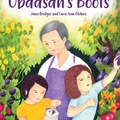TORONTO — Award-winning author Leslie Shimotakahara transports readers to another time and place through her novels. Her vibrant characters and vivid landscapes begin with inspiration grounded in stories she’s heard—particularly from her maternal and paternal grandmothers—that spark her imagination and then take form through careful research.
“It is stories and experiences and having known these women when I was very small. These images or scenes tease at my imagination over time and that gets supplemented by historical research. Then gradually, a larger narrative starts to take place,” Shimotakahara tells Nikkei Voice in an interview.
Shimotakahara is a Toronto-based author whose memoir, The Reading List, won the Canada-Japan Literary Prize. Her previous fiction includes Red Oblivion and the critically acclaimed After the Bloom.
Her new novel, Sisters of the Spruce, transports readers to the wild landscapes of Haida Gwaii (then known as the Queen Charlotte Islands) in Northern B.C. during the First World War. There, communities and cultures blend and clash when Japanese, Chinese, and Caucasian settlers, and Indigenous peoples converge at a logging camp. Shimotakahara sets the novel during the height of the First World War, with the logging industry booming and the region starting to open up.

The story follows Khya, a 14-year-old Japanese Canadian girl, transplanted to the remote inlet in Northern B.C. with her family. Looking for a fresh start, her father, Sannosuke, a talented logger, takes a leadership position for the Japanese and Chinese workers at the logging camp.
Sisters of the Spruce was inspired by stories Shimotakahara’s maternal grandmother shared about growing up on the islands as a teenager. Her father relocated the family there between 1920 and 1929 to work as a foreman at a shingle factory (and later as the town’s first Asian postal worker).
Shimotakahara’s grandmother would tell her about the history of the Charlottes during the First World War, when the Allies desperately needed lumber from Sitka spruces that grew there—enormous, durable trees—to build fighter planes, leading a booming logging industry.
“[My] impression of Queen Charlottes Islands was this very sort of rugged and wild landscape. She talked about the snow, she talked about the mammoth trees, she talked about the shimmering waters,” says Shimotakahara.
“She talked about it as also a place of all these sorts of eccentric people living up there, her father being one of them, of course, because it takes a certain personality type to move your family out to a very rugged, undeveloped region.”
While Shimotakahara was researching and writing, an invaluable research source brought a new perspective to the book: the translations of her great-grandfather Sannosuke’s journal.
Sannosuke immigrated to Canada from Japan in the mid-1890s, in his late 20s, working the fishing and logging trade around the Skeena River and various other parts of Northern B.C. He kept a diary written over a century ago and recently translated by two of her mother’s cousins, along with a professional translator. The diary took years to translate, written in an archaic form of Japanese.
A mixture of collected writing, from poetic observations about the landscape to more prescriptive, like manuals, ideas, and discoveries, the diary helped shape Shimotakahara’s understanding of her great-grandfather, the inspiration for Khya’s father in the book.
“He never really went back to Japan, except to visit, because he fell in love with the Canadian landscape. I think he liked exploring. He liked being out in the world,” says Shimotakahara.
In Sisters of the Spruce, their new life is knocked off balance when white loggers arrive, eager to assert their authority over Khya’s father, leading to the betrayal of her older sister and humiliation for the family. Khya sets off on a perilous journey with her new friend, Daisy, to find and confront the man who wronged her sister.
Shimotakahara weaves a story about characters often overlooked in history, set during a time dominated by male perspectives. Sisters of the Spruce is a story of female friendship, adventure, and resilience set against the majestic landscape of Haida Gwaii.
“One of the quotations at the beginning of the novel is from Adventures of Huckleberry Finn, which is very much a boy’s adventure story about two male characters who go on this journey together, so I was sort of experimenting with that genre and then wanting to tell it from very much a female perspective,” says Shimotakahara.
Khya is also unlike many female characters of her time. She contrasts her sister Izzy, who was living with relatives in Japan. Izzy studied ikebana and sumi-e and is timid and lovely, the classic Japanese girl, while Khya couldn’t be more different. With no brothers (except for an older one living with relatives in Japan), Khya is her father’s second-in-command at the logging camp, often helping with physical work.
“Khya is very much a tomboy, which I think is how my grandmother was back then,” says Shimotakahara.
“She was very capable. She had a forceful personality. Many people, like her older sisters when they came back from Japan, thought she was bossy and sort of full of herself. She really became the inspiration for Khya. I wanted to write about a character like this, a heroine at the centre of my novel because I think this is a character type that doesn’t often get represented in literature.”
As Khya and Daisy take off into the rugged B.C. wilderness, the characters and landscape come to life in vivid detail through careful research by Shimotakahara and inspiration from stories that have grown in her imagination since childhood.
“I just hope [readers] really kind of savour it as a tale of girlhood adventure, a tale that brings to life some historical figures from that period that are generally not mentioned in Canadian literature,” says Shimotakahara.
* * * * *
Sisters of the Spruce is now available at local and major bookstores.
To learn more about Leslie Shimotakahara visit her site.
*This article was originally published in The Nikkei Voice on March 2024.
© 2024 Kelly Fleck






